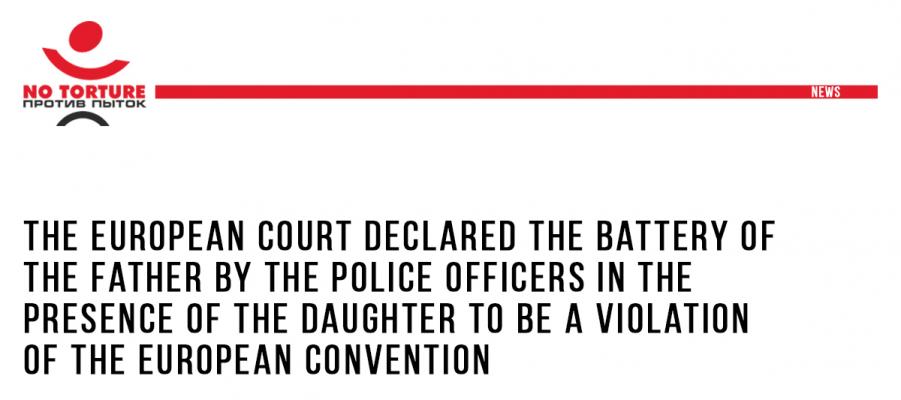
Today, on 12 November 2019, the European Court of Human Rights passed a ruling in the interests of a resident of the Krasnodar Territory – in 2008 a police officer brutally beat up her father in her presence, due to this fact she has been having serious psychological problems. The Strasbourg judges acknowledged that the article of the European Convention guaranteeing the prohibition of torture and brutal treatment was violated with regard to the applicant, as well as the right to effective investigation. Due to this she has been awarded a compensation for moral damage in the amount of 25 000 euros.
On 31 May 2008, Marina (the name is changed – author’s note) together with his father planned to go home after the celebration event at school. However, after she sat in the back seat of the car, several men ran up to her father, one of them knocked him down and started to beat him up hitting him all over his body. Subsequently, it turned out they were the drug law enforcement and FSB officers who were acting in the framework of the operational activity “test purchasing”, organized by the 21st department for Tuapse of the regional department of the Federal Agency of Russia for Drug Trafficking Control for the Krasnodar Territory.
Marina saw her father being beaten, jumped out of the car, started to shout loudly that they stopped beating up her father. In response to that, some of the officers shouted to her: “Shut up your mouth and get in the car”. The girl got scared and got back in the car. For some time, she was there alone, continuing to observe her father being beaten up. Then she jumped out of the car and ran along the street without any adult’s supervision. Sometime later, her relative found her in the street accidentally in the state of deep shock and stress.
On 3 June 2008, the girl was examined by the neurologist, who diagnosed her with a neurological syndrome and a neurosis-like enuresis due to the psycho-traumatic situation that she was exposed to. Later on, she was also diagnosed with post-traumatic stress disorder, neurogenic hyper-reflexory bladder and a mitral valve prolapse. She started to cry during the night and have nightmares, she became secluded and started to fear people, it became very hard for her to study and to take up music, despite the fact that previously she had promised well and used to be the best pupil in her class. By the present time, her psychological state has not fully restored.
On 10 July 2008, Marina’s relatives applied to the Prosecutor’s Office with a complaint against the actions of the law-enforcement officers participating in the apprehension of the girl’s father. After four days, the prosecutor’s office investigator refused to initiate criminal proceedings, having contented himself with the evidence of the law-enforcement officers participating in the apprehension, but ignoring the testimony of the girl, her relatives, as well as the data of the medical documents.
This ruling was quashed, however, after that the investigator issued three more refusals. The last refusal to initiate criminal proceedings was appealed against in courts, however, it was declared legal and grounded.
On 14 April 2009, having exhausted all available remedies, Marina’s relatives submitted an application to the European Court of Human Rights. On 11 September 2017, the complaint was communicated to the Russian authorities.
It is notable, that the apprehension of Marina’s father was appealed against at the domestic court and was declared illegal. The criminal case with regard to him was dismissed in December 2009 due to the fact that the evidence was obtained illegally – including, as a result of unlawful apprehension.
“The fact of the father’s apprehension inflicted an irreparable psychological damage to the girl, and, in fact, it could have been avoided by correct planning of the operation, which should have aimed not only at the suspect’s apprehension, but also at protection of the interests of the girl and her psychological integrity, – head of the International Legal Department of the Committee Against Torture Olga Sadovskaya, representing the interests of the applicant at the European Court, comments. – The Russian authorities excused themselves saying that they could not predict the presence of a child during the apprehension. But this sounds very unconvincing, because the father was apprehended after the special event at school where he was together with his daughter”.
Today, the European Court of Human Rights passed the ruling on the application in favor of the applicant.
The Strasbourg judges resolved that a violation of Article 3 of the European Convention of Human Rights in the material and procedural aspects took place, because the authorities failed to prevent the brutal treatment committed against the applicant, and failed to perform the effective investigation of her complaint against the brutal treatment. The court obliged the Russian Federation to pay 25 000 Euro to the applicant as a compensation for moral damage.
“Previously, the European Court identified in case “Gutsanovi vs. Bulgaria” that possible presence of small children at the place of their parents’ apprehension is a factor which should be taken into account during planning and conducting special operations. In our case the interests of a nine-year old girl were ignored by the representatives of Russian law-enforcement authorities at all the stages of planning and conducting the operation on apprehension of her father. With regard to this, the European Court predictably admitted that an individual violation of the article guaranteeing the prohibition of torture and brutal treatment took place in the form of poorly planned operation, as a result of which the child suffered”, – Olga Sadovskaya emphasized.